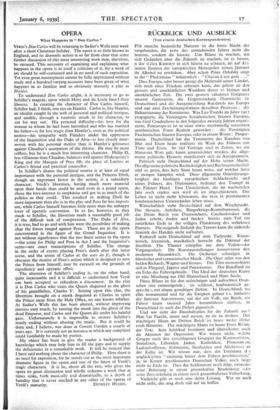OPERA
What Happens in " Don Carlos "
Vzam's Don Carlos will be returning to Sadler's Wells next week after a short Christmas holiday. The opera is so little known in England, and its dramatic action is so far from clear that some further discussion of this most interesting work may, therefore, be excused. This necessity a examining and explaining what happens in the opera is in itself a criticism of it, for a work of art should be self-contained and in no need of such exposition. Yet even great masterpieces cannot be fully appreciated without study and a hundred varying accounts have been given of what happens in so familiar and so obviously masterly a play as -Hamlet.
To understand Don Carlos aright, it is necessary to go to Schiller's tragedy, upon which Mery and du Lock based their libretto. In creating the character of Don Carlos himself, Schiller had, I think, one eye on Hamlet. Carlos is, like Hamlet, an idealist caught in the web of personal and political intrigue, and unable, through a neurotic streak in his character, to cut his way out. His personal difficulty—his love for the woman to whom he had been betrothed and who has married his father—is far less tragic than Hamlet's, even as the political motive—his sympathy with Flanders under the oppression of the Inquisition and the Duke of Alva—is less closely inter- woven with his personal motive than is Hamlet's grievance against Claudius's usurpation of the throne. He may be more selfless, but he is a much less interesting character. Philip II, less villainous than Claudius, balances well against Shakespeare's King and the Marquis of Posa fills the place of Laertes as Carlos's friend and practical counsellor.
In Schiller's drama the political motive is at least of equal importance with the personal intrigue, and the Princess Eboli, though an important factor in the action, is a subsidiary character. Verdi's librettists, having much more material upon their hands than could be used even in a grand opera, chose the love-interest to emphasise and got in as much of the politics as they could. This resulted in making Eboli far more important than she is in the play and Posa far less import- ant, while Carlos himself becomes little more than the unhappy lover of operatic convention. In so far, however, as they stuck to Schiller, the librettists made a reasonably good job of the difficult task of compression. The Duke of Alva, it is true, had to go and with him went the possibility of making clear the forces ranged against Posa. These are in the opera concentrated in the figure of the Grand Inquisitor. It is not without significance that the two finest scenes in the opera —the scene for Philip and Posa in Act I and the Inquisitor's scene—are . exact transcriptions of Schiller. The change in the order of events placing Posa's death after this latter scene, and the arrest of Carlos at the auto da fe, though it obscures the motive of Posa's action which is designed to save the Prince from himself, may be excused on the grounds of expediency and operatic effect.
The alteration of Schiller's ending is, on the other hand, quite inexcusable and it is difficult to understand how Verdi can have accepted so ridiculous a denouement. In the play it is Don Carlos who visits the Queen disguised as the ghost of his grandfather, Charles V. Seizing upon this clue, the librettists brought on a monk disguised as Charles to spirit the Prince away from the Holy Office, no one knows whither. At Sadler's Wells this has been altered, without improving matters very much, by turning the monk into the ghost of the dead Emperor, and Carlos and the Queen die under his baleful gaze. Unfortunately it is impossible to restore Schiller's manly ending without altering the music. But it could be done and, I believe, was done at. Covent Garden a couple of years ago. It is certainly not an instance in which any complaint could justifiably be made by purists.
My object has been to give the reader a background of knowledge which may help him to fill the gaps and to supply the deficiencies in a remarkable work. It will be noticed that I have said nothing about the character of Philip. Here there is no need for exposition, for he stands out as the most important dramatic figure in the opera and one of the finest of Verdi's tragic characters. It is he, above all the rest, who gives the opera its great distinction and wholly redeems a work that at times sinks, both musically and dramatically, to a depth of banality that is never reached in any other of the operas of










































 Previous page
Previous page